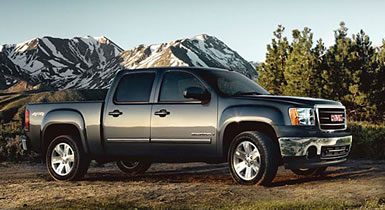
San Francisco: The
full-size pickup truck market in America is huge. For a long time, GMC,
Chevy, Ford, and Dodge have had this market to themselves, but now some
Japanese brands are stepping up with their entries. Itís brutally
competitive. So GMC needs its brand new Sierra to be a winner.
The Sierraís styling
employs bold forms, including a monumental chrome-ringed rectangular
grille, stacked sparkly headlamps, arching fender bulges, and big shiny
wheels. This new iteration is traditional truck chunky, but the corners
are sanded down a little for a more elegant presentation.
The new Sierra follows
GMís recent trend towards more handsome interiors. The surfaces are
nicely textured, the pieces meet in precise joins and seams, and the
materials look durable. Drivers get a full gauge package that is sunk
into the dash in a way that makes it look exceptionally substantial.
There is a double glovebox on the passenger side.
As usual with trucks,
there are lots of choices and configurations, starting with the basic
working manís truck, with a regular cab, two-wheel-drive, and the base
195-horsepower 4.3-liter V6. The SLE models pick up from there, followed
by the higher-level SLTs and finally, the Denali model at the top. You
can order regular, extended, or crew cabs. There are three bed lengths
ranging from five-foot-eight through a full eight feet. You can get
two-wheel drive or four.
Four sizes of V8 engine
are offered, starting with the 4.8-liter, 295 version thatís standard on
most models. You can select from several flavors of the 5.3-liter V8.
The 6.0-liter V8 pushes horsepower up to 367 and is available on models
with enhanced trailering capacity.
At the top reigns the
6.2-liter, 400-horsepower beast, exclusive to the Sierra
Denali flagship.
Hauling capacity is identified as 1500 for the standard type, 2500 and
3500 for the heavy duty models, and the mighty Denali transcendent.
My Stealth Gray
Metallic test truck was an SLE model, 1500 level, four-wheel-drive,
extended cab. Thatís somewhere in the lower middle of the chart. The
extended cab uses back doors that hinge at the rear and open out and
back against the edge of the cargo box to a 170 degree angle - almost
flat. The windows roll down on these narrow doors.
The rear area of the
extended cab does not provide as much legroom as the Crew Cab, but it is
adequate. The rear seats fold up easily so you can load bulkier objects
behind the front seats. The front row is so wide that you can put three
people across, or two can share an expansive armrest & storage locker.
My tester was upgraded
to one of the 5.3-liter engines. This powerplant was interesting for two
reasons. First of all, it had cylinder deactivation, which automatically
runs the engine on only four cylinders when conditions permit. If youíre
cruising on level ground or rolling downhill, you donít need eight
cylinders burning fuel. Posted EPA mileage is 16 City, 20 Highway. I got
13.4 mpg during my week.
The other interesting
factor on my testerís engine was its FlexFuel capacity. It can burn E85
ethanol, gasoline, or a mixture of both. As a responsible journalist and
viewer of An Inconvenient Truth, I decided to seek out some ethanol.
Lots of luck! In Northern California there are exactly zero stations
open to the public. Apparently there are more stations in the Midwest,
where corn, from which ethanol is made, is more abundant. Check the
National Ethanol
Vehicle Coalitionís website at www.e85refueling.com to see where E85
ethanol stations are located in your area.
The EPA Green Vehicle
Guide contains many entries for different models, but it appears that my
tester would earn a score of 6 on the Air Pollution index and 2 on the
Greenhouse Gas index. I donít know how much difference the different
fuels would make.
Sierra prices begin at
$18,760. My test truck started at $29,600, but rapidly grew costlier
with numerous premium enhancements, including remote vehicle starting
capacity ( a really neat option! ), 17-inch alloy wheels, automatic
dual-zone air conditioning, power adjustable pedals, and upgraded audio
system with XM Radio. The list goes on. My truck, in the end, came to
$35,635.
The GMC Sierra is
strong and comfortable, looks and feels well crafted, and is
surprisingly quiet. I donít recommend the Sierra for commuting duties,
unless you work on a lonely mountaintop, but for normal working and
hauling, the Sierra is a contender. By
Steve Schaefer © AutoWire.Net - San Francisco

GMC Home Page
Byline: Syndicated
content provided by Tony Leopardo © AutoWire.Net
Column Name: New. Big.
Better.
Topic: The 2007 GMC
Sierra
Word Count: 800
Photo Caption: The
2007 GMC Sierra
Photo Credits: GMC
Sierra Internet Media
Series #: 2007 - 23
Download
the Microsoft Word version here:
2007 GMC Sierra
Download the Original Image File here:
2007 GMC Sierra


|
